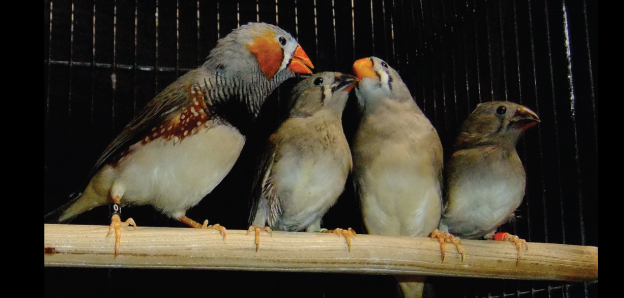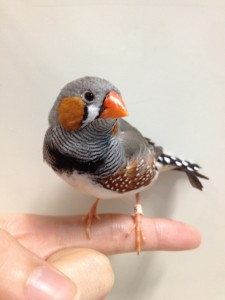A Song From the Heart: Juvenile Songbirds Not Coerced to Practice
Research Press Release | June 22, 2015
-
 Zebra finches
Zebra finches -
 Zebra finches crooning a song
Zebra finches crooning a song
| Press Release | ||
|---|---|---|
| Key Points | ・The number of times and frequency of vocal practice “singing” per day by juvenile songbirds and adults greatly differs.
・Juvenile songbirds which are learning to sing perform concentrated vocal practice more often in a day than adult birds which have finished learning song patterns. ・The song pattern of the juvenile songbirds changes considerably over the course of concentrated vocal practicing and breaks. ・When the vocal frequency during vocal practice decreases, or auditory input ceases, diurnal changes in singing pattern also decreases. ・Learning to vocal patterns (songs) by juvenile songbirds is considered to be a good animal behavior model regarding how self-motivated learning in individual development is controlled, and its effect on learning development itself. |
|
| Overview |
For humans, self-motivated practice is important in learning, such as learning a language, playing a musical instrument, and learning athletic skills (sensorimotor learning). Juvenile songbirds listen and memorize the songs of their fathers, and then carry out vocal practice every day for 2-3 months to crystallize their own song. In the process, the juvenile songbirds are not forced by anyone, and voluntarily repeat vocal practice. At this time, we identified how vocal practice, which occurred more than 1,000 times per day, was carried out each day, and how such practice progressed. As a result of analysis of files recorded over 3 months obtained by 24 hour automatic recording, the number of times and frequency of “singing” in a day greatly differed between juvenile songbirds performing vocal practice and adult birds which had finished learning. Juvenile songbirds which were learning a song pattern concentrated on vocal practicing for short periods during the day. In contrast, adult birds had a tendency to sing with less zeal throughout the day. In vocal practicing by juvenile songbirds, the song the birds first started to sing in the morning of the day gradually changed to a different song pattern, but after they took a break, they would change back to the pattern of the song they first started to sing in the morning. In other words, fluctuation in vocal pattern for better or worse (reversion back to the original pattern) occurred within a day, coinciding with the timing of vocal practice and a break within the day. This change in the song pattern was no longer observed when the frequency of vocal practice in a day decreased artificially or when auditory input ceased. In this study, we identified the effect of the number of times, timing, and frequency of self-motivated practice in the developmental learning of behavior pattern within a day. |
|
| Inquiries |
Kazuhiro WADA, Department of Biological Sciences, Faculty of Science, Hokkaido University TEL & FAX: +81-11-706-4443 E-mail: wada@sci.hokudai.ac.jp |
|
|
Japanese Link |
学習時の集中的な練習と休憩が行動発達に与える影響を小鳥のさえずり研究で発見 | |
| Publications | Diurnal oscillation of vocal development associated with clustered singing by juvenile songbirds , The Journal of Experimental Biology (2015.6.1) | |

